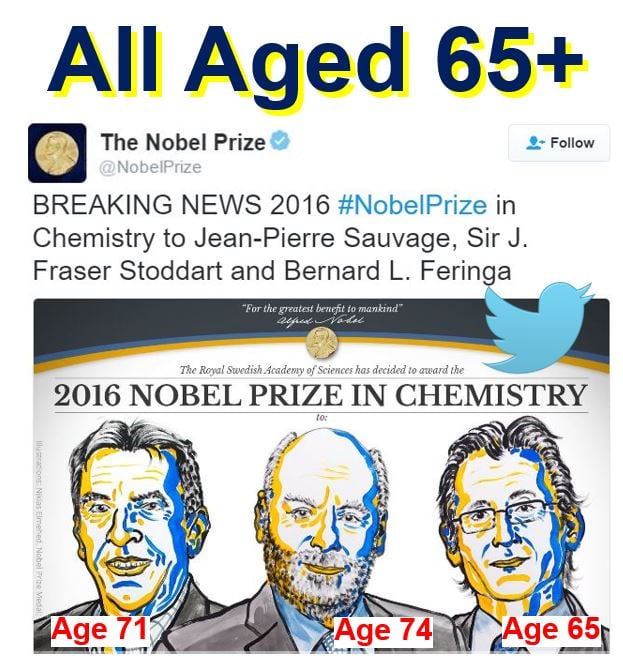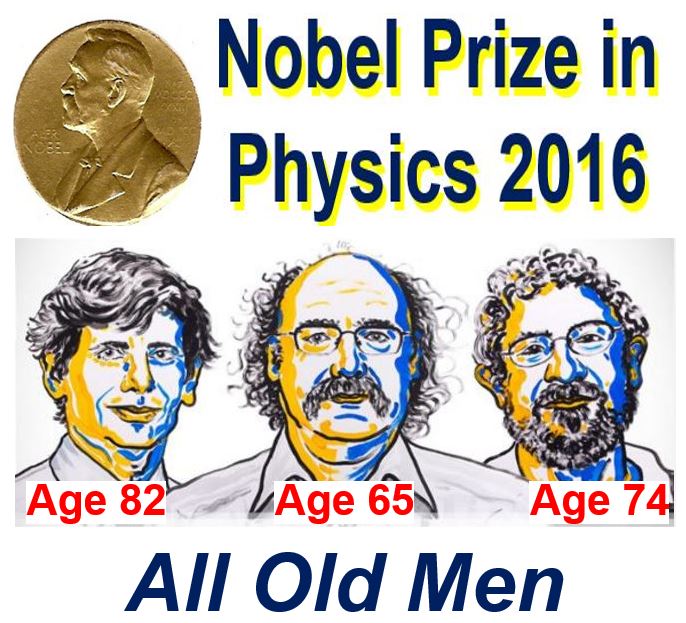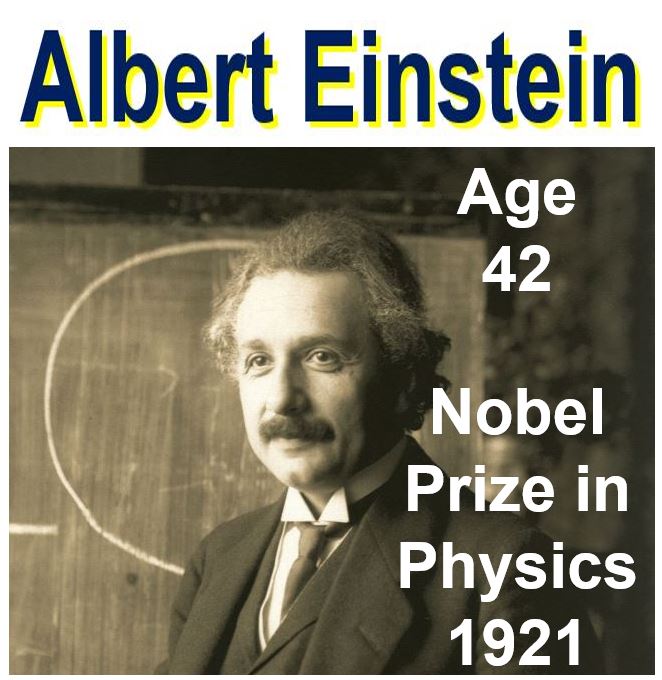Over the past few years, the Nobel Prize in traditional sciences has been awarded to older and older people. Earlier this month, the Royal Swedish Academy of Sciences awarded the Nobel Prize in Physics 2016, with one half going to David J. Thouless (82), and the other half to Duncan M. Haldane (65), and J. Michael Kosterlitz (74).
All Nobel laureates for chemistry, physics and medicine this year were men aged at least sixty-five years – the majority of them 71+.
During the first half of the last century, the average age of a Noble Prize winner was 56 years. The average age of this year’s Physics winner is 74 years, compared to 47 during the late 1960s.
 This year’s Nobel Laureates in Chemistry – Jean-Pierre Sauvage (left), Sir J. Fraser Stoddart (centre) and Bernard L. Feringa (left) – are all aged at least sixty-five years. (Image: twitter.com/NobelPrize)
This year’s Nobel Laureates in Chemistry – Jean-Pierre Sauvage (left), Sir J. Fraser Stoddart (centre) and Bernard L. Feringa (left) – are all aged at least sixty-five years. (Image: twitter.com/NobelPrize)
Nobel prize winners older since 1950s
The trend now is to award the traditional sciences prizes to people during their advancing years. Nobel Prize winners have been gradually getting older and older since the 1950s.
Some people suggest that there is so much more we know about science now; it takes much longer to read up on it all, hence people later in life are the ones who know the most and most likely to make major breakthroughs.
We are also living much longer than during the 1950s or 1920s. In the world’s advanced economies (developed nations), average lifespan was about 65 years in the 1950s – today it is more than 80 years for both men and women.
Perhaps the older Nobel laureates today would not have made their scientific breakthroughs had they been of previous generations – they would have been dead.
 The winners of the Nobel Prize in Physics 2016 – David J. Thouless (left), Duncan M. Haldane (centre), and J. Michael Kosterlitz (left) – are all old men. Fifty years ago, the physics Nobel laureate’s average age was much younger. (Image: adapted from cam.ac.uk/research/news)
The winners of the Nobel Prize in Physics 2016 – David J. Thouless (left), Duncan M. Haldane (centre), and J. Michael Kosterlitz (left) – are all old men. Fifty years ago, the physics Nobel laureate’s average age was much younger. (Image: adapted from cam.ac.uk/research/news)
Nobel Prize competition greater now
BBC News quoted Gustav Källstrand, a senior curator at the Nobel Museum, who explained that there are about one million physicists in the world today, compared to just 1,000 one-hundred years ago.
Dr. Källstrand said:
“So this is one important factor. The waiting time for getting a Nobel Prize is getting longer and you do not get a prize immediately after a breakthrough.”
Even today, younger researchers are making discoveries. However, there are many thousands of other scientists doing the same across the world. The Nobel Prize Committee requires an extremely high standard for validation. All these factors combined make it much harder to win an award – it also takes considerably longer.
Other laureates not getting older
Surely, we could say the same for other disciplines. Economists and people striving for peace are much more abundant today than a century ago. However, those Nobel Prize winners are not getting older, but the physics laureates are.
 According to nobelprize.org, Albert Einstein was awarded the Nobel Prize in Physics in 1921 at the age of 42 “for his services to Theoretical Physics, and especially for his discovery of the law of the photoelectric effect.” (Image: Wikipedia)
According to nobelprize.org, Albert Einstein was awarded the Nobel Prize in Physics in 1921 at the age of 42 “for his services to Theoretical Physics, and especially for his discovery of the law of the photoelectric effect.” (Image: Wikipedia)
Dr. Källstrand points out that physics in the first half of the 20th Century was a rapidly-growing field, especially when the field of quantum mechanics came onto the scene.
During that expansion, many young physicists made extraordinary discoveries. The Nobel Committee members were very interested in quantum mechanics, and closely monitored scientific achievements.
Video – Nobel Prize in Physics 2016
In this Nobel Prize video, you can see the announcement of the Nobel Prize in Physics 2016, which was shared by three people.

